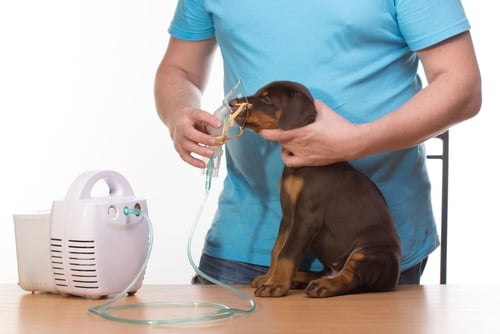
Table of Contents
Years after the COVID-19 pandemic, there's a new viral disease in town spreading around the US… but this time, it's affecting dogs.
More than 200 dogs showing symptoms of a respiratory illness have been reported in Oregon since mid-August, with some infections said to have occurred earlier in the summer.
The Oregon Veterinary Medical Association noted that veterinarians in other states, like New Hampshire, have reported similar respiratory illnesses in dogs as far back as 2022.
Colorado, Illinois, Rhode Island, Massachusetts, California, Indiana, Washington, Idaho, Georgia, and Florida also have documented reports of affected canines in their area.
Experts say this unknown disease can make dogs very sick within 24 to 36 hours and, in cases of severe infection, dead.
Signs, Symptoms, and Diagnosis
The signs and symptoms of this new canine respiratory illness are somewhat similar to Canine Influenza and Kennel Cough.
Experts advise to bring your dog to the vet once you see the following symptoms:
- Persistent coughing
- Sneezing
- Difficulty breathing
- Nasal and eye discharge
- Lack of appetite
- Lethargy
- Fever
But while Canine Influenza and Kennel Cough are treatable, this particular type of infection doesn't respond to treatments.
Antibiotics like doxycycline haven't been effective in treating or even minimizing the symptoms of this new canine disease.
Unfortunately, antivirals won't work either, as long as the type of virus causing it remains unidentified.
“Looks like it's a virus. Viruses do not respond to antibiotics, and antivirals won't be effective until we know what that virus is,” Dr. Kiko Bracker, a veterinarian at MSPCA Angell Medical Center in Jamaica Plain, Massachusetts, told CBS News Boston.
Furthermore, another alarming difference experts have observed is the duration.
In Kennel Cough, the symptoms usually only last one to three weeks. In this new respiratory illness, the symptoms last for six to eight weeks or more.
Experts also say this new disease has a higher chance of developing into full-blown pneumonia, which may be life-threatening to dogs.
Affected canines show similar signs of infection in the upper respiratory tract. However, what baffles scientists is standard testing doesn't show positive results.
Based on the epidemiology of the cases reported to date, ODA says the cases appear to share a viral etiology, but common respiratory diagnostic testing has been largely negative, and the cause remains unknown.
While death following the infection has been reported in some states, it's still not considered part of the overall syndrome of this canine respiratory illness.
Instead, this may ‘represent secondary infections,' said Dr. David Needle, senior veterinary pathologist and clinical associate professor at the University of New Hampshire.
“Fatalities do not seem to be a large part of the syndrome we are investigating, with rare animals developing an acute and sometimes fatal pneumonia after the longer chronic disease,” he said.
Dr. Needle, who has been investigating this mysterious canine illness for almost a year now, said there was also not a large increase in canine deaths.

What Experts Know (and Have Done) So Far
Experts are still on the lookout for the possible causative agent of this disease.
It's still unclear whether the respiratory infection is caused by a bacteria or a virus.
Dr. Needle said, “If what we have identified is a pathogen, it is likely that the bacteria is host-adapted bacteria with long histories of colonizing dogs.”
But then, an ‘evolutionary event' is possible, where the bacteria goes into spontaneous mutation or evolves to become virulent, he added.
Currently, the Oregon Department of Agriculture is working closely with the US Department of Agriculture's National Veterinary Services Laboratory, the Oregon Veterinary Diagnostic Laboratory, state researchers, and several emergency veterinary practices nationwide to implement a diagnostic testing plan.
This includes a widespread sampling of potential respiratory cases in different states, paired with PCR testing and genome sequencing, to find out what's causing the illness.
State veterinarians are also encouraged to report cases of patients showing the symptoms mentioned above as soon as they come in.
Treatment is unknown as long as the cause remains unknown.
For now, vets and pet owners can give supportive care to manage the symptoms and ease the discomfort of a canine patient.
This will also depend on the severity of a dog's infection.
Meanwhile, additional diagnostics have also been put into place in different laboratories of the National Animal Health Laboratory Network.
Dr. Needle and his colleagues at the Hubbard Center for Genome Research have already looked at samples from affected canines in Rhode Island, New Hampshire, and Massachusetts.
They expect more samples from Oregon, Colorado, and other states in the coming days.
‘Caution Rather Than Worry'
While there is still much to learn about this condition, pet owners are advised not to panic but to be cautious about bringing their dogs to crowded places.
While hundreds of affected dogs have been reported in different states, experts say it's still a small part of the canine population in the US.
In an interview with the New York Times, Dr. Stephen Kochis, chief medical officer for the Oregon Humane Society, said the number of cases reported to ODA represents a small number of all the dogs in the state.
“We are not seeing an uptick in respiratory disease outside of the ordinary expectation for pets that would get respiratory disease,” he said.
Veterinarians and pet owners also observed that one common thing among affected dogs is that, at some point, they have been in a boarding facility.
In an interview, virology professor Colin Parrish said that animal shelters, boarding facilities, doggy daycare, and doggy parks are common grounds for respiratory disease outbreaks in dogs.
“They call it kennel cough, which is a catchall for different respiratory illnesses,” he said. “Most dogs have a mild disease and recover uneventfully. That's why people are concerned. This is something new.”

How to Protect Your Dog from this Mysterious Illness
In general, Canine Infectious Respiratory Diseases are common, the same way coughs and colds happen to humans.
And just like coughs and colds, CIRDC is highly transmissible, too.
Cornell Richard P. Riney Canine Health Center veterinarian Dr. Brian Collins recommends monitoring cases in your area.
He explained how respiratory tract infections tend to be very transmissible and usually spread through direct contact.
They can also spread the diseases by coughing and breathing through expelled respiratory droplets.
To protect your dog from respiratory illnesses, it's best to avoid going to places where dogs congregate—parks, daycare, boarding facilities, etc.
What does this mean, then, to families going out of town for the holidays but aren't able to bring their dogs along?
Dr. Amanda Cavanagh, a veterinarian who specializes in emergency and critical care at Colorado State University, advised pet owners to consider a sitter instead.
“If you don’t have to board your dog, use a pet sitter. If you don’t have to go to a dog park or doggy daycare, try to avoid it. Don’t exercise with other dogs who are not from the same house,” she said.
If boarding your dog is unavoidable, then make sure that his vaccination is up-to-date.
This includes the four common vaccines for distemper, adenovirus, parainfluenza, and parvovirus, plus additional shots for Bordetella and Canine Influenza.
Vaccines take a while to kick in, so it's better to get your dogs these if you plan to leave for the December holidays.
Most importantly, if you see any of the signs we have discussed above, don't think twice and see your vet immediately.
The Oregon Medical Veterinary Association has excellent advice for pet owners to follow amid this mysterious canine respiratory disease outbreak:
– Reduce contact with large numbers of unknown dogs. Like other respiratory pathogens, the more contacts your dog has, the greater the risk of encountering an infectious dog.
– Reducing contact with sick dogs. This can be harder to determine, but if a dog looks sick (coughing, runny nose, runny eyes), keep it away.
– Keep sick dogs at home and seek veterinary care.
– Avoid communal water bowls shared by multiple dogs.
– Ask your veterinarian for advice on which vaccinations your dog should have. Common vaccinations include canine influenza, Bordetella, and parainfluenza.
– If it's sick, consider having your dog tested with a PCR test to help determine the causative agent (viral/bacterial).
How's your area? Have you heard of any similar cases nearby? How do you make sure Fido's happy and healthy?
Let us know in the comments section!
You can also browse through some of our related articles below.












